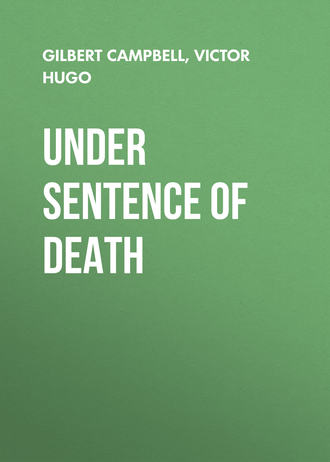
Виктор Мари Гюго
Under Sentence of Death
CHAPTER XXII
After passing through jungle, and crossing many a torrent, we arrived in a valley situated in the higher part of the hills, of a singular wild and savage appearance. The spot was absolutely unknown to me. The valley was situated in the heart of the hills, in what is called the double mountains. It was a large green plain, imprisoned by walls of bare rock, and dotted with clumps of pines and palm-trees. The cold, which at this height is very severe, was increased by the morning air, the day having just commenced to break, but the valley was still plunged in darkness, and was only lighted by flashes from the negroes’ fires; evidently this spot was their headquarters. The shattered remains of their army had begun to reassemble, and every now and then bands of negroes and mulattoes arrived, uttering groans of distress and cries of rage. New fires were speedily lighted, and the camp began to increase in size. The negro whose prisoner I was had placed me at the foot of an oak, whence I surveyed this strange spectacle with entire carelessness. The black had bound me with his belt to the trunk of the tree, against which I was leaning, and carefully tightening the knots in the cords which impeded my movements, he placed on my head his own red woollen cap, as if to indicate that I was his property, and after making sure that I could not escape or be carried off by others, was preparing to leave me, when I determined to address him, and speaking in the Creole dialect I asked him if he belonged to the band of Dondon, or of Morne-Rouge. He stopped at once, and in a tone of pride replied “Morne-Rouge.” Then an idea entered my head. I had often heard of the generosity of the chief Bug-Jargal, and though I had made up my mind that death would soon end all my troubles, yet the thought of the tortures that would inevitably precede it should I fall into the hands of Biassou, filled me with horror. All I wanted was to be put to death without torment. It was perhaps a weakness, but I believe that the mind of man ever revolts at such a death. I thought then, that if I could be taken from Biassou, Bug-Jargal might give me what I desired—a soldier’s death. I therefore asked the negro of Morne-Rouge to lead me to Bug-Jargal. He started. “Bug-Jargal,” he repeated, striking on his forehead in anguish; then, as if rage had suddenly overtaken him, he shook his fist, and shouting “Biassou, Biassou,” he left me hastily.
The mingled rage and grief of the negro recalled to my mind the events of the day, and the certainty we had acquired of either the death or capture of the chief of the band of Morne-Rouge. I felt that all hope was over, and resigned myself to the threatened vengeance of Biassou.
CHAPTER XXIII
A group of negresses came near the tree to which I was fastened, and lit a fire. By the numerous bracelets of blue, red, and violet glass which ornamented their arms and ankles, by the rings which weighed down their ears and adorned their toes and fingers, by the amulets on their bosoms and the collar of charms suspended round their necks, and by the aprons of variegated feathers which were their sole coverings, I at once recognized them as griotes. You are perhaps ignorant that amongst the African blacks there exists a certain class with a rude talent for poetry and improvisation, which approaches closely to madness. These unhappy creatures, wandering from one African kingdom to another, are in these barbarian countries looked upon in the same light as the minstrels of England, the minnesingers of Germany, and the troubadours of France. They are called griots, and their wives griotes. The griotes accompany the barbaric songs of their husbands with lascivious dances, and form a grotesque parody on the nautch girls of India and the almes of Egypt. It was a group of these women who came and sat down near me, with their legs crossed under them according to their custom, and their hideous faces lighted up by the red light of a fire of withered branches. When they had formed a complete circle they all took hands, and the eldest, who had a heron’s plume stuck in her hair, began to exclaim “Ouanga.” I at once understood that they were going through one of their performances of pretended witchcraft. Then the leader of the band, after a moment’s silence, plucked a lock of hair from her head and threw it into the fire, crying out these words, “Malé o guiab,” which in the jargon of the Creoles means, “I shall go to the devil.” All the griotes imitated their leader, and throwing locks of their hair in the fire, repeated gravely, “Malé o guiab.” This strange invocation, and the extraordinary grimaces that accompanied it, caused me to burst into one of those hysterical fits of laughter which so often seize on one even at the most serious moments. It was in vain that I endeavoured to restrain it—it would have vent; and this laugh which escaped from so sad a heart brought about a gloomy and terrifying scene.
Disturbed in their incantations, the negresses sprang to their feet. Until then they had not noticed me, but now they rushed close up to me, screaming “Blanco, Blanco.” I have never seen so hideous a collection of faces, contorted as they were with passion, their white teeth gleaming, and their eyes almost starting from their heads. They were, I believe, about to tear me to pieces, when the old woman with the beaver’s plume on her head stopped them with a sign of her hand, and exclaimed seven times, “Zoté cordé!” (“Do you agree?”) The wretched creatures stopped at once, and, to my surprise, tore off their feather aprons, which they flung upon the ground, and commenced the lascivious dance which the negroes call “La chica.”
This dance, which should only consist of attitudes and movements expressive of gaiety and pleasure, assumed a very different complexion when performed by these naked sorceresses. In turn, each of them would place her face close to mine, and, with a frightful expression of countenance, would detail the horrible punishment that awaited the white man who had profaned the mysteries of their Ouanga.
I recollected that savage nations had a custom of dancing round the victims that they were about to sacrifice, and I patiently awaited the conclusion of the performance which I knew would be sealed with my blood; and yet I could not repress a shudder as I perceived each griote, in strict unison with the time, thrust into the fire the point of a sabre, the blade of an axe, a long sail-maker’s needle, a pair of pincers, and the teeth of a saw.
The dance was approaching its conclusion, and the instruments of torture were glowing red with heat.
At a signal from the old woman, each negress in turn withdrew an implement from the fire, whilst those who had none furnished themselves with a blazing stick. Then I understood clearly what my punishment was to be, and that in each of the dancers I should find an executioner. Again the word of command was given, and the last figure of the dance was commenced. I closed my eyes that I might not see the frantic evolutions of these female demons, who, in measured cadence, clashed the red-hot weapons over their heads. A dull, clinking sound followed, whilst the sparks flew out in myriads. I waited, nerving myself for the moment when I should feel my flesh quiver in agony, my bones calcine, and my muscles writhe under the burning tortures of the nippers and the saws. It was an awful moment. Fortunately it did not last long.
In the distance I heard the voice of the negro whose prisoner I was, shouting, “Que haceis, mujeres, ne demonio, que haceis alli, devais mi prisonero?” I opened my eyes again; it was already broad daylight. The negro hurried towards me, gesticulating angrily. The griotes paused, but they seemed less influenced by the threats of my captor than by the presence of a strange-looking person by whom the negro was accompanied.
It was a very stout and very short man—a species of dwarf—whose face was entirely concealed by a white veil, pierced with three holes for the eyes and mouth. The veil hung down to his shoulders, and displayed a hairy, copper-hued breast, upon which was hung by a golden chain the mutilated sun of a monstrance.
The cross-hilt of a heavy dagger peeped from a scarlet belt, which also supported a kind of petticoat striped with green, yellow, and black, the hem of which hung down to his large and ill-shaped feet.
His arms, like his breast, were bare; he carried a white staff, and a rosary of amber beads was suspended from his belt, in close proximity to the handle of his dagger. His head was surmounted by a pointed cap adorned with bells, and when he came close I was not surprised in recognizing in it the gorra of Habibrah; and amongst the hieroglyphics with which it was covered, I could see many spots of gore: without doubt, it was the blood of the faithful fool. These bloodstains gave me fresh proofs of his death, and awakened in me once again a fresh feeling of regret for his loss.
Directly the griotes recognized the wearer of Habibrah’s cap, they cried out all at once, “The Obi,” and prostrated themselves before him. I guessed at once that this was a sorcerer attached to Biassou’s force.
“Basta, basta” (“enough”), said he, in a grave and solemn voice, as he came close up to them. “Devais el prisonero de Biassou” (“Let the prisoner be taken to Biassou”).
All the negresses leapt to their feet and cast their implements of torture on one side, put on their aprons, and, at a gesture of the Obi, fled like a cloud of grasshoppers.
At this instant the glance of the Obi fell upon me. He started back a pace, and half waved his white staff in the direction of the retiring griotes, as if he wished to recall them; then, muttering between his teeth the word “Maldicho” (“accursed”), he whispered a few words in the ear of the negro, and, crossing his arms, retired slowly, apparently buried in deep thought.
CHAPTER XXIV
My captor informed me that Biassou had asked to see me, and that in an hour I should be brought before him. This, I calculated, gave me another hour in which to live. Until that time had elapsed, I allowed my glances to wander over the rebel camp, the singular appearance of which the daylight permitted me to observe. Had I been in any other position, I should have laughed heartily at the ostentatious vanity of the negroes, who were nearly all decked out in fragments of clerical and military dress, the spoils of their victims. The greater portion of these ornaments were not new, consisting of torn and blood-stained rags. A gorget could often be seen shining over a stole, whilst an epaulet looked strange when contrasted with a chasuble.
To make amends for former years of toil, the negroes remained in a state of utter inaction: some of them slept exposed to the rays of the sun, their heads close to a burning fire; others, with eyes that were sometimes full of listlessness, and at others blazed with fury, sat chanting a monotonous air at the doors of their ajoupas—a species of hut with conical roofs somewhat resembling our artillery tents, but thatched with palm or banana leaves.
Their black or copper-coloured wives, aided by the negro-children, prepared the food for the fighting-men. I could see them stirring up with long forks, ignames, bananas, yams, peas, cocus and maize, and other vegetables indigenous to the country, which boiled with joints of pork, turtle, and dog in the great boilers stolen from the dwellings of the planters. In the distance, on the outskirts of the camp, the griots and griotes formed large circles round the fires, and the wind every now and then brought to my ears strange fragments of their barbaric songs, mingled with notes from their tambourines and guitars. A few videttes posted on the high ground watched over the headquarters of the General Biassou: the only defence of which in case of attack was a circle of waggons filled with plunder and ammunition. These black sentries posted on the summits of the granite pyramids, with which the valley bristled, turned about like the weathercocks in Gothic spires, and with all the strength of their lungs shouted one to the other the cry of “Nada, nada” (“Nothing, nothing”), which showed that the camp was in full security. Every now and then groups of negroes, inspired by curiosity, collected round me, but all looked upon me with a threatening expression of countenance.
CHAPTER XXV
At length an escort of negro soldiers very fairly equipped arrived. The negro whose property I appeared to be, unfastened me from the oak to which I was bound, and handed me over to the escort, receiving in exchange a bag full of piastres. As he lay upon the grass counting them with every appearance of delight, I was led away by the soldiers. My escort wore a uniform of coarse cloth, of a reddish-brown colour, with yellow facings; their head-dress was a Spanish cap called a montera, ornamented with a large red cockade. Instead of a cartouche case, they had a species of game-bag slung at their sides. Their arms were a heavy musket, a sabre, and a dagger. I afterwards learned that these men formed the body-guard of Biassou.
After a circuitous route through the rows of ajoupas, which were scattered all over the place, I came to a cave which nature had hollowed out in one of those masses of rock with which the meadow was full. A large curtain of some material from the looms of Thibet, which the negroes called Katchmir, and which is remarkable less for the brilliancy of its colouring than for the softness of its material, concealed the interior of the cavern from the vulgar gaze. The entrance was guarded by a double line of negroes, dressed like those who had escorted me thither.
After the countersign had been exchanged with the sentries who marched backwards and forwards before the cave, the commander of the escort raised the curtain sufficiently for me to enter, and then let it drop behind me. A copper lamp with six lights hung by a chain from the roof of the grotto, casting a flickering light upon the damp walls. Between the ranks of mulatto soldiers I perceived a coloured man sitting upon a large block of mahogany, which was partially covered with a carpet made of parrots’ feathers. His dress was of the most absurd kind. A splendid silk girdle, from which hung a cross of Saint Louis, held up a pair of common blue trousers, whilst a waistcoat of white linen which did not meet the waistband of the trousers completed the strange costume. He wore high boots, and a round hat with a red cockade, and epaulets, one of gold with silver stars like those worn by brigadiers, whilst the other was of red worsted with two copper stars, which seemed to have been taken from a pair of spurs, fixed upon it, evidently to render it more worthy of its resplendent neighbour. A sabre and a pair of richly chased pistols lay by his side.
Behind the throne were two white children dressed in the costume of slaves, bearing large fans of peacock feathers.
Two squares of crimson velvet, which seemed to have been stolen from some church, were placed on either side of the mahogany block. One of these was occupied by the Obi who had rescued me from the frenzy of the griotes. He was seated with his legs crossed under him, holding in his hand his white wand; and not moving a muscle, he looked like a porcelain idol in a Chinese pagoda, but through the holes in his veil I could see his flashing eyes fixed steadfastly upon mine.
Upon each side of the general were trophies of flags, banners, and pennons of all kinds; among them I noticed the white flag with the lilies, the tricolour, and the banner of Spain. The others were covered with fancy devices. I also perceived a large standard entirely black.
At the end of the grotto, I saw a portrait of the mulatto Ogé who, together with his lieutenant Jean Charanne, had been broken on the wheel the year previous, for the crime of rebellion. Twenty of his accomplices, blacks and mulattoes, suffered with him.
In this painting Ogé, the son of a butcher at Cap, was represented in the uniform of a lieutenant-colonel, and decorated with the star of St. Louis, and the Order of Merit of the Lion, which last he had purchased from the Prince of Limburg.
The negro general into whose presence I had been introduced was short and of vulgar aspect, whilst his face showed a strange mixture of cunning and cruelty. After looking at me for some time in silence, with a bitter omen on his face, he said—
“I am Biassou.”
I expected this, but I could not hear it from his mouth, distorted as it was by a cruel smile, without an inward trembling; but my face remained unchanged, and I made no reply.
“Well,” continued he, in his bad French, “have they already impaled you, that you are unable to bend before Biassou, generalissimo of this conquered land, and brigadier of His Most Catholic Majesty?” (The rebel chiefs sometimes affected to be acting for the King of France, sometimes for the Republic, and at others for the King of Spain.)
I crossed my arms upon my chest, and looked him firmly in the face.
He again sneered. “Ho, ho,” said he, “me pareces hombre de buen corazon (“You seem a courageous man”); well, listen to my questions. Were you born in the island?”
“No, I am a Frenchman.”
My calmness irritated him.
“All the better; I see by your uniform that you are an officer. How old are you?”
“Twenty.”
“When were you twenty?”
To this question, which aroused in me all the recollection of my misery, I could not at first find words to reply. He repeated it imperiously.
“The day upon which Leogri was hung,” answered I.
An expression of rage passed over his face as he answered.
“It is twenty-three days since Leogri was executed. Frenchman, when you meet him this evening you may tell him from me that you lived twenty-four days longer than he did. I will spare you for to-day, I wish you to tell him of the liberty that his brethren have gained, and what you have seen at the headquarters of General Jean Biassou.”
Then he ordered me to sit down in one corner between two of his guards, and with a motion of his hand to some of his men, who wore the uniform of aide-de-camps, he said,
“Let the assembly be sounded, that we may inspect the whole of our troops; and you, your Reverence,” he added, turning to the Obi, “put on your priestly vestments, and perform for our army the holy sacrament of the Mass.”
The Obi rose, bowed profoundly, and whispered a word or two in the general’s ear.
“What,” cried the latter, “no altar! but never mind, the good Giu has no need of a magnificent temple for His worship. Gideon and Joshua adored Him before masses of rock, let us do as they did; all that is required is that the hearts should be true. No altar, you say—why not make one of that great chest of sugar which we took yesterday from Dubussion’s house?”
This suggestion of Biassou was promptly carried into execution. In an instant the interior of the cave was arranged for a burlesque of the divine ceremony. A pyx and a monstrance stolen from the parish church of Acul were promptly produced (the very church in which my nuptials with Marie had been celebrated, and where we had received heaven’s blessing which had so soon changed to a curse).
The stolen chest of sugar was speedily made into an altar and covered with a white cloth, through which, however, the words Dubussion and Company for Nantes could be plainly perceived.
When the sacred vessels had been placed on the altar, the Obi perceived that the crucifix was wanting. He drew his dagger which had a cross handle, and stuck it into the wood of the case in front of the pyx. Then without removing his cap or veil, he threw the cope which had been stolen from the priest of Acul over his shoulders and bare chest, opened the missal with its silver clasps from which the prayers had been read on my ill-fated marriage day; and turning towards Biassou, whose seat was a few paces from the altar, announced to him that all was ready.
On a sign from the general the Katchmir curtains were drawn aside, and the insurgent army was seen drawn up in close column before the entrance to the grotto.
Biassou removed his hat and knelt before the altar.
“On your knees,” he cried, in a loud voice.
“On your knees!” repeated the commander of the battalions.
The drums were beaten, and all the insurgents fell upon their knees.
I alone refused to move, disgusted at this vile profanation about to be enacted under my very eyes; but the two powerful mulattoes who guarded me pulled my seat from under me, and pressed heavily upon my shoulders so that I fell on my knees, compelled to pay a semblance of respect to this parody of a religious ceremony. The Obi performed his duties with affected solemnity, whilst the two white pages of Biassou officiated as deacon and sub-deacon. The insurgents, prostrated before the altar, assisted at the ceremony with the greatest enthusiasm, the general setting the example.
At the moment of the exaltation of the host, the Obi, raising in his hands the consecrated vessel, exclaimed in his Creole jargon,
“Zoté coné bon Giu; ce li mo fé zoté voer. Blan touyé li, touyé blan yo toute!” (“You see your good God; I am showing Him to you. The white men killed Him; kill all the whites!”)
At these words, pronounced in a loud voice, the tones of which had something in them familiar to my ear, all the rebels uttered a loud shout, and clashed their weapons together. Had it not been for Biassou’s influence that hour would have been my last. To such atrocities may men be driven who use the dagger for a cross, and upon whose mind the most trivial event makes a deep and profound impression.





